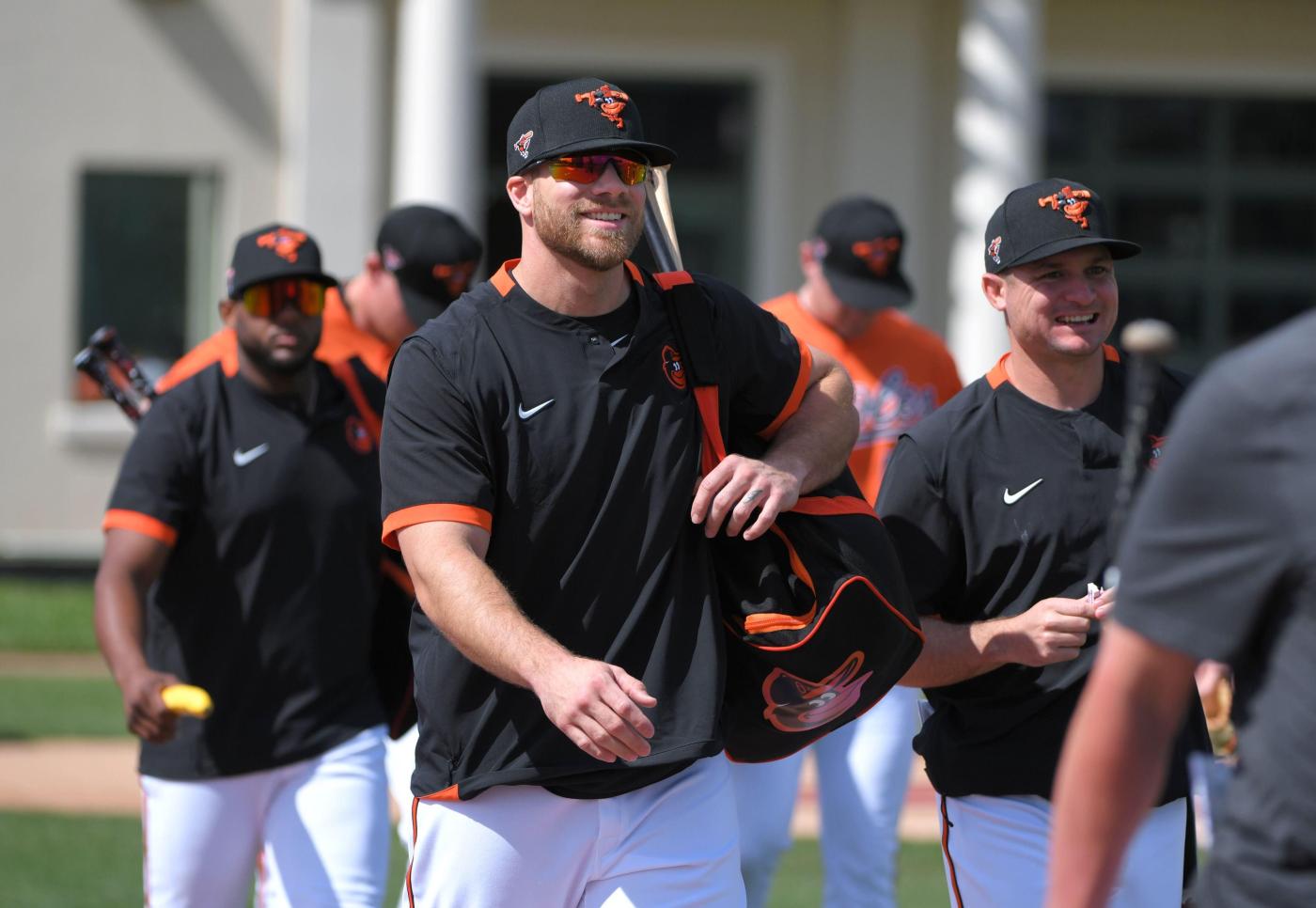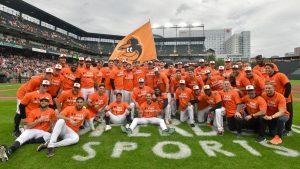
For Chris Davis, retirement from Orioles has meant more time to give back
Before his first public appearance at Camden Yards since he retired, Chris Davis wasn’t nervous, but the longtime Orioles first baseman recognized he could have reason to be.
In Baltimore, Davis was a two-time home run champion and a key figure in the franchise’s most successful run in decades, but soon after he signed a club-record contract, both he and the Orioles plummeted. When a hip injury ended Davis’ career in 2021, fans were left with mixed feelings about his tenure.
But when he returned to Camden Yards in September as one of the former players who attended Adam Jones’ retirement ceremony, Davis received one of the largest ovations from the sellout crowd.
“I was like, ‘It’s gonna be interesting to see the reception that I get,’ and I was extremely, extremely pleased and moved,” Davis said. “I know that there were some tough years in Baltimore, but there were also a lot of great memories that I have from my time, and not just playing.”
He pointed to the work he and his wife, Jill, did with the Casey Cares Foundation, a Maryland-based nonprofit that supports critically ill children, and the University of Maryland Children’s Hospital, with those efforts including a $3 million donation toward a hybrid catheterization suite to treat children with heart defects.
With his playing career over, Davis has dived further into philanthropic projects. He and Jill are lead team members for Compassion International’s “The Fight for First” campaign, which aims to improve the survival rate of mothers and children in impoverished areas in the first year of life.
“The biggest thing that we’re trying to accomplish is to give these kids an opportunity to have a life and not just to experience a lot of firsts, but to actually enjoy them,” Davis said. “When I look at our girls, and even when I look at our lives, we didn’t have to worry about not making it to our first birthday. And when you see the statistics of the infant mortality rates, the fact that not only the kids, but these moms are dying because they just don’t have the general knowledge or resources, and the fact that when Compassion does come in these areas, the fact that they’re almost squashing these numbers, it’s like, well, why wouldn’t we get involved?”
The Davises first partnered with Compassion, a Christian humanitarian nonprofit focused on helping children in poverty, in 2011, shortly after the Orioles acquired the first baseman in a trade with the Texas Rangers. Since, they have sponsored several children, supported the construction of development centers and backed other programs, such as the “Fill the Stadium” effort during the coronavirus pandemic.
The goal of The Fight for First is to fund 500 survival centers, which would support 25,000 mothers and babies each by the end of 2024. Children 3 years and older can be sponsored and supported through Compassion, but the organization found that many children weren’t making it to that age, prompting the introduction of The Fight for First.
The parents of three young girls — 9-year-old Ella and 5-year-old twins Grace and Evie — the Davises recognize their family had fortunes and benefits many others around the world do not.
“The odds are so stacked against these moms, and parenting is hard here, being a mom is hard here,” Jill Davis said. “What we call hard is just almost unbearable to think about in their situation, right? It’s hard here, so I just can’t imagine living in one of these communities or delivering my twins in one of these communities. There’s a very high probability that neither Grace nor I would be here. We wouldn’t have beat it.
“It just shouldn’t be that way. We have so much access to so many things here, and we just want to spread that around.”
Jill noted that in vulnerable areas with a Compassion center, infant mortality rates have dropped from about 31 of every 1,000 children to nearly zero. Every $1,000 donated toward The Fight for First supports one mother and child through the baby’s first birthday, while every $15,000 is enough for a survival center saves 25 mothers and children.
As was the case during his playing career, Davis hopes to encourage other athletes to be involved. Seven-time All-Star Matt Holliday and his wife, Leslee — the parents of top Orioles prospect Jackson Holliday — are also on The Fight for First’s lead team, with other pros from MLB, the NFL, the NHL and more among the supporters thus far.
“With the platform that they’re given and the amount of money that you can make in your baseball career, I would always encourage athletes to give financially,” Davis said. “But I think the biggest thing is once your time is over in baseball and you have a little bit more freedom to move and to go, I think getting your hands dirty is really to me what makes it all worth it.”
That, Davis said, has been one of the most satisfying parts of retirement. He and Jill sponsor children throughout Latin America and Africa, and with half of the calendar no longer built around the baseball schedule, they have been able to plan and take trips to meet them, visit community centers they have helped support and simply meet face to face with members of Compassion who they had been able to only email with previously.
“That’s how we want to spend our time, not just financially backing some of these places, but get an opportunity to go meet some of these people,” Davis said. “That, to me, is really where the impact is greatest.”
Although Davis is finding fulfilling ways to fill his time, he misses baseball, too. He’s scratched the itch somewhat through coaching, occasionally helping with infielders and hitters at practices at Liberty Christian High School in Argyle, Texas; he also guided Ella’s third-grade basketball team to a championship.
“It’s not a big deal,” he quipped.
He also was thrilled to follow along with the Orioles’ season, watching as several players who began their careers near the end of his played key roles as Baltimore won 101 games and the American League East.
When Davis retired, the Orioles were amid a 2021 season that ended with 110 losses, the third straight full season they had lost at least 108 times. Davis struggled immensely during that stretch, batting .196 over the course of the seven-year, $161 million contract he signed after a 2015 season in which he led the majors in home runs for the second time in three years.
But he valued the connections he built during that time. Core outfielders Cedric Mullins, Anthony Santander and Austin Hays made their debuts with Davis as a teammate. Ryan Mountcastle, the Orioles’ current first baseman, still uses a glove he got from Davis. During a stint at the alternate training site in 2020, Davis got to be around phenoms Adley Rutschman, Gunnar Henderson and Grayson Rodriguez, getting a firsthand look at the future that was brewing. Throughout the season, Davis texted general manager Mike Elias and manager Brandon Hyde to tell them how proud he was and how much he enjoyed watching the team.
In many ways, it reminded him of the successful run that preceded his and the Orioles’ struggles, when Baltimore consistently exceeded external expectations to be the AL’s winningest team from 2012 to 2016.
“That was kind of our MO early on: Nobody’s gonna pick us to win, nobody cares about us, everybody thinks we’re losers, and we’re gonna prove everybody wrong,” Davis said. “I think that that mentality really brought us so close together, when we’re talking about the group that started winning, and I saw a lot of that in the guys this year.
“I saw there was just a fire in them that they didn’t care who was picking them and who wasn’t picking them, that they were just going to go out and play good baseball and that they were going to play together.”
He’s grateful that those young players treated him as a veteran with respect during their time together, something he said he will “always appreciate.” He hopes he imparted some lessons on them that paid off not only this season but also in their lives and careers down the line, especially when it comes to the effect they can have away from the field.
“Being able to play in the big leagues is a blessing in itself, and you don’t know how long it’s gonna last,” Davis said. “You don’t know what your career is gonna look like, but the impact that you can have, not only on the community that you’re in, but where you are in the offseason, and even globally, is so huge, and it doesn’t take a lot.
“You can give a little, and it goes a long way.”
()

